RED Talks Video Archive
Dr. Cranos Williams
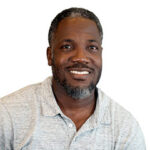
Professor, Electrical and Computer Engineering, North Carolina State University
Date: March 16, 2021
Time: 4:00 PM to 5:00 PM
Talk Title: Computational Intelligence and Machine Learning Approaches for Modeling Plant Systems Within and Across Biological Scale
Abstract
The next revolution in precision agriculture solutions will require improved understanding of the complex regulatory mechanisms that are instrumental in plant growth, development, and adaptation. Key in these efforts is the ability to acquire and analyze data across biological scales (from molecular to phenotypic scales). High-throughput data that have been collected across biological scales include molecular data such as gene expression profiles and confocal imaging to data capturing plant physiology such as hyperspectral imaging and remote sensing. The diversity of these datasets (in combination with the complexity of plant systems) have created opportunities for the development of novel computational intelligence and machine learning approaches that are capable of modeling plant systems within and across biological scales. In this presentation we provide a brief overview of approaches for analyzing various types of high-throughput biological data. These approaches address the many challenges associated with analyzing biological data, including the need to mitigate high variation and/or uncertainty, the need for novel segmentation and feature extraction, and the integration of disparate datasets for making causal inferences across scale. The application of these approaches has led to scientific contributions such as the modeling of key gene regulatory mechanisms involved in plant stress response, the identification of emergent properties that link molecular activity to phenotypic outcomes, and the development of automated high-throughput phenotyping approaches for early detection of plant diseases. The continued acquisition of high-throughput data across scale and the continued development of novel machine learning and modeling tools will provide opportunities to further push the boundaries of our understanding of plant systems and will be key to better understanding how plants respond to complex environments.
Bio
Dr. Cranos Williams is a professor in the Electrical and Computer engineering department at North Carolina State University. He directs the EnBiSys Research Laboratory, which is a highly collaborative, multidisciplinary research laboratory, focused on the development of targeted computational and analytical solutions for modeling and controlling biological systems. The solutions are used to build and strengthen the transition from large-scale high-throughput -omics data to highly connected kinetic models in the post-genomic era; models that can be used to attain the depth, understanding, and comprehension needed to manipulate and control biological systems for a defined purpose. These efforts have direct application to efficient biofuel production, plant adaptability to pollution and climate change, and improvement of plant defenses to pathogens and pests. His research addresses four major topics associated with modeling biological systems: experimentation, estimation, implementation, and integration.
Jesse D. Lecy
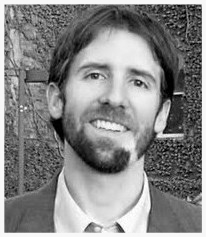
Associate Professor in Nonprofit Studies and Data Science, Arizona State University and academic director of the M.S. in Program Evaluation and Data Analytics program.
Date: February 17, 2021
Time: 4:00 PM
Location: Virtual
Talk Title: Identity, Mission and Agency: The Demographic Sorting of Nonprofit Boards, the Geography of Services, and the Control of Resources
Abstract
Using an administrative database of newly-formed nonprofits, we are able to geocode the location of 1.5 million board members of 300,000 new nonprofits and create statistical profiles of founding teams through spatial joins to US Census tracts. This allows us to compare mission statements of nonprofits working in the same service areas such as arts or human services but have founding teams with distinct demographic traits. Comparisons can leverage the gender, race, and income of teams to see which traits predict the most divergence in mission statements. Mission text is analyzed using semantic network analysis. Comparisons of missions across groups is accomplished using a new approach to hypothesis-testing with semantic networks, and preliminary results will be presented. The research is laying the foundations to explore how the nonprofits sector is being shaped by rising inequality, gentrification, racial segregation, the geographic sorting of political ideology, and other important factors that are actively shaping economic and civic life in the United States.
Bio
I am an Associate Professor in Nonprofit Studies and Data Science at Arizona State University and academic director of the M.S. in Program Evaluation and Data Analytics program. I teach masters and PhD-level courses in public management, nonprofit management, applied statistics, program evaluation, urban policy, and data programming in R.
My research broadly covers the economics of the nonprofit sector, social innovation, urban policy and data science. Topics include nonprofit entrepreneurship, capital markets for social enterprises, open science, open data, and open-source software for performance management.
Dr. Evan Fraser
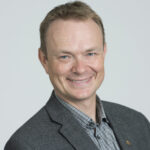
Director, Arrell Food Institute at the University of Guelph and professor, Geography, University of Guelph
Date: Thursday, November 5, 2020
Time: 4:00 PM
Location: Virtual Registration to follow soon
Talk Title: Agriculture 5.0: the potential, and potential limits, of technology to build resilient sustainable food systems for the 21st century
Abstract
Today the same technologies that brought us the Internet and are transforming medicine are reshaping food and farming systems. Smart tractors that know where they are in the field and plant the right seed in the right place and give it the right amount of fertilizer, robotic milkers that boost productivity while maintaining herd health and reducing potentially harmful inputs such as antibiotics, vertical farms that allow any crop to be produced anywhere anytime, and alternative protein products that provide high quality foodstuffs to consumers at minimal environmental cost… These technologies are all on the cusp of going mainstream and are talked about with breathless anticipation in the media. In this talk, Dr. Evan Fraser from the University of Guelph will provide a high-level overview of the potential for these technologies to create stronger and more resilient food systems while also reflecting on limitations, barriers, and bottlenecks. In a presentation that will be one-part techno-optimism and one-part critical reflection on the application of technologies, Dr. Fraser will attempt to describe some of the things that need to happen if we want the digital agricultural revolution to make food systems more sustainable, resilient, profitable, and nutritious.
Bio
A passionate communicator, Evan has written for the Globe and Mail, the Guardian.com, CNN.com, ForeignAffairs.com, the Walrus and the Ottawa Citizen, and has two popular non- fiction books about food and food security including Empires of Food: Feast, Famine and the Rise and Fall of Civilizations that was published by Simon and Schuster and shortlisted for the James Beard Food Literature Award. He has also co-produced/co-hosted 3 1-hour radio documentaries for CBC’s premier documentary show Ideas on the future of food. Today, Evan is the director of the Arrell Food Institute at the University of Guelph, which was established by a $20 million-dollar gift from the Arrell Family Foundation. He is also a full professor of Geography at the University of Guelph and helps lead the Food from Thought initiative, which is a $76.6 million research program based at the University of Guelph that explores how to use big data to reduce agriculture’s environmental footprint.
Dr. Joseph DeCarolis

Associate Professor, Department of Civil, Construction, and Environmental Engineering, North Carolina State University
Date: Tuesday, October 20, 2020
Time: 11:00 AM to 12:00 PM
Location: Virtual
Talk Title: Energy Systems Modeling with High Performance Computing Resources
Event Description
In this talk, Dr. Joseph DeCarolis, Professor in the Department of Construction, Civil, & Environmental Engineering at NC State, will highlight ongoing work using Tools for Energy Model Optimization and Analysis (Temoa), an open source energy system optimization model developed at NC State that is designed to conduct rigorous uncertainty analysis and make use of high-performance computing resources.
The Research Computing series is a forum for information sharing about high-performance computing, deep learning, parallel computing, and other relevant topics. This talk is being offered in conjunction with Energy Week.
Bio
Dr. DeCarolis is an Associate Professor in the Department of Civil, Construction, and Environmental Engineering at North Carolina State University. His research program is focused on addressing energy and environmental challenges at the intersection of engineering, economics, and public policy. His primary focus is the development and application of energy system models to analyze how energy technology and public policy can shape a sustainable future. With regard to energy modeling, he is particularly interested in the development and utilization of open source software to maximize model transparency as well as the use of high performance computing to conduct rigorous uncertainty analysis. Dr. DeCarolis is currently working on other research topics, including the economics of marine energy technologies, the integration of building energy simulation into the architectural design process, and solid waste management in a carbon constrained world. He teaches Introduction to Sustainable Infrastructure (CE250), Energy and Climate (CE478/578), Energy Modeling (CE796), and Life Cycle Assessment (CE796).
Dr. Matthew Hansen
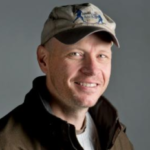
Professor, Department of Geographical Sciences, University of Maryland
Date: March 4, 2020
Time: 5:00 PM
Location: SAS Hall, Room 2203
Talk Title: Monitoring Global Land Change
Abstract
From deforestation to urbanization, the human footprint on the land surface is ever-expanding, converting natural land covers into land uses or intensifying current land uses. Land-use change results in loss of biodiversity, increased greenhouse gas emissions, alteration of hydrological systems, among other impacts. Rates of land-use change can be quantified using time-series earth observation data from satellites. A subset of satellite systems features global acquisition strategies with no or low-cost data access, and a consequent ability to monitor global land cover and land use extent and change. In terms of earth observation infrastructure, we are in a golden age of such satellite systems, including NASA/USGS Landsat satellites, the Sentinel series of the European Space Agency, and also commercial providers such as Planet. The integrated use of multi-source data dramatically improves monitoring capabilities, reducing the uncertainties around many important land dynamics, such as deforestation rates and crop area estimation. In this talk, a number of themes will be presented with a focus on our improving capabilities to accurately quantify global land change.
Bio
Matthew Hansen is a remote sensing scientist and a professor of BSOS-Geography at The University of Maryland. His research is focused on developing improved algorithms, data inputs, and thematic outputs which enable the mapping of land cover change at regional, continental, and global scales. Professor Hansen’s work as an Associate Team Member of NASA’s MODIS Land Science Team included the algorithmic development and product delivery of the MODIS Vegetation Continuous Field land cover layers.
Dr. Steven Koonin
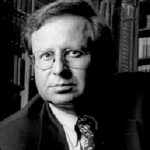
Director, Center for Urban Sciences and Progress at New York University
Date: November 20, 2019
Time: 5:00 PM
Location: Talley Student Union Coastal Ballroom
Talk Title: Urban Data
Abstract
For the first time in history, more than half of the world’s population lives in urban areas; in just a few more decades, the world’s population will exceed 9 billion, 70 percent of whom will live in cities. Enabling those cities to deliver services effectively, efficiently, and sustainably while keeping their citizens safe, healthy, prosperous, and well-informed will be among the most important undertakings in this century. I will review how work on data acquisition, integration and analysis at NYU’s Center for Urban Science and Progress is leading to a better understanding (and hence improvement) of urban systems. Novel analyses of persistent synoptic imagery will be an important part of the story.
Bio
Steven E. Koonin, a University Professor at New York University, was the founding director of NYU’s Center for Urban Science and Progress from 2012-2018. Before joining NYU, Dr. Koonin served as the second Under Secretary for Science at the U.S. Department of Energy from May 2009 through November 2011. In that capacity, he oversaw technical activities across the Department’s science, energy, and security activities and led the Department’s first Quadrennial Technology Review for energy. Before joining the government, Dr. Koonin spent five years as Chief Scientist for BP plc, where he focused on alternative and renewable energy technologies. Dr. Koonin was a professor of theoretical physics at California Institute of Technology (Caltech) from 1975-2006 and was the Institute’s Provost for almost a decade. He is a member of the U.S. National Academy of Sciences and the JASON advisory group. Dr. Koonin holds a B.S. in Physics from Caltech and a Ph.D. in Theoretical Physics from MIT (1975) and is a trustee of the Institute for Defense Analyses.
Dr. Cynthia Rudin

Professor of Computer Science, Electrical and Computer Engineering, and Statistical Science, Duke University
Date: November 6, 2019
Time: 4:00 PM
Location: James B. Hunt Library Duke Energy Hall
Talk Title: Secrecy, Criminal Justice, and Variable Importance
Abstract
The US justice system often uses a combination of (biased) human decision makers and complicated black box proprietary algorithms for high stakes decisions that deeply affect individuals. All of this is still happening, despite the fact that for several years, we have known that interpretable machine learning models were just as accurate as any complicated machine learning methods for predicting criminal recidivism. It is much easier to debate the fairness of an interpretable model than a proprietary model. The most popular proprietary model, COMPAS, was accused by the ProPublica group of being racially biased in 2016, but their analysis was flawed and the true story is much more complicated; their analysis relies on a flawed definition of variable importance that was used to identify the race variable as being important.
In this talk, I will start by introducing a very general form of variable importance, called model class reliance. Model class reliance measures how important a variable is to any sufficiently accurate predictive model within a class. I will use this and other data-centered tools to provide our own investigation of whether COMPAS depends on race, and what else it depends on. Through this analysis, we find another problem with using complicated proprietary models, which is that they seem to be often miscomputed. An easy fix to all of this is to use interpretable (transparent) models instead of complicated or proprietary models in criminal justice.
Bio
Cynthia Rudin is a professor of computer science, electrical and computer engineering, statistics, and mathematics at Duke University, and directs the Prediction Analysis Lab. Previously, Prof. Rudin held positions at MIT, Columbia, and NYU. She holds an undergraduate degree from the University at Buffalo, and a PhD in applied and computational mathematics from Princeton University. She is a three time winner of the INFORMS Innovative Applications in Analytics Award. She holds an NSF CAREER award, was named as one of the “Top 40 Under 40” by Poets and Quants in 2015, and was named by Businessinsider.com as one of the 12 most impressive professors at MIT in 2015. She is past chair of the INFORMS Data Mining Section, and past chair of the Statistical Learning and Data Science section of the American Statistical Association. She also serves on (or has served on) committees for DARPA, the National Institute of Justice, the National Academy of Sciences (for both statistics and criminology/law), and AAAI. She is a fellow of the American Statistical Association and a fellow of the Institute of Mathematical Statistics. She will be the Thomas Langford Lecturer at Duke University during the 2019-2020 academic year.
Dr.Tamara G. Kolda
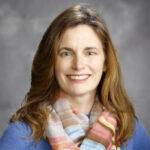
Sandia National Laboratories
Date: October 29, 2018
Time: 6:00 PM
Location: 2203 SAS Hall
Talk Title: Decomposition: A Mathematical Tool for Data Analysis
Abstract
Tensors are multiway arrays, and these occur naturally in many data analysis. Consider a series of experiments tracking multiple sensors over time, resulting in a three-way tensor of the form experiment-by-sensor-by-time. Tensor decompositions are powerful tools for data analysis that can be used for data interpretation, dimensionality reduction, outlier detection, and estimation of missing data. In this talk, we consider the mathematical, algorithmic, and computational challenges of tensor methods and highlight their wide ranging utility with examples in neuroscience, chemical detection, social network analysis, and more. We discuss several new developments, including a new “generalized” version of tensor decomposition that allows for alternative statistically-motivated fitting functions.
Dr. Guillermo Sapiro

Duke University
Date: October 15, 2018
Time: 5:00 PM
Location: Duke Energy Hall C/D, Hunt Library, Centennial Campus, NC State University
Talk Title: It’s Your Data and Your Decision: Learning Representations to Keep Your Privacy
Abstract
It is becoming increasingly clear that users should own and control their data. Utility providers are also becoming more interested in guaranteeing data privacy. As such, users and utility providers should collaborate in data privacy, a paradigm that has not yet been developed in the privacy research community. We introduce this concept and present explicit architectures where the user controls what characteristics of the data she/he wants to share and what she/he wants to keep private. This is achieved by collaborative learning a sensitization function, either a deterministic or a stochastic one, that retains valuable information for the utility tasks but it also eliminates necessary information for the privacy ones. As illustration examples, we implement them using a plug-and-play approach, where no algorithm is changed at the system provider end, and an adversarial approach, where minor re-training of the privacy inferring engine is allowed. In both cases the learned sanitization function keeps the data in the original domain, thereby allowing the system to use the same algorithms it was using before for both original and privatized data. We show how we can maintain utility while fully protecting private information if the user chooses to do so, even when the first is harder than the second, as in the case here illustrated of identity detection while hiding gender. We also present examples showing how secure devices can be designed to protect the privacy of ordinary people around the device. This talk is based on joint work with M. Bertran, N. Martinez, A. Papadaki, Q. Qiu, M. Rodrigues.
C. Titus Brown
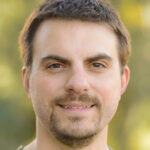
UC Davis
Date: September 11, 2018
Time: 6:00 PM
Location: 2203 SAS Hall
Talk Title: The Secret Life of Microbial Genomes
Abstract
Recent advances in large scale sequencing of microbial DNA without culturing or isolation gives us easy and direct access to “wild” microbial metagenomes that are otherwise virtually impossible to study. Our recent work has focused on studying the ecology and genomics of microbial genomes and “population” pan-genomes in environmental samples, using tools and approaches developed in our lab and in collaboration with others. We see many ways in which microbial genomes do not particularly resemble our naive expectations, which is leading us into some productive confusion around known knowns, known unknowns, and unknown unknowns in environmental microbial systems.Our work relies heavily on novel methods and technical infrastructure development. In this talk I will present a series of vignettes on our techniques and some of the results, aimed at a general scientific audience.
Dr. Elliot Inman

Date: September 27, 2016
Time: 7:00 PM
Location: Mountains Ballroom, Talley Student Union
Talk Title: Quantification: The Art of Making Data
Abstract
In this Data Science Initiative talk and the DH Hill Makerspace workshops that follow, we will explore the art of making data – from the mechanics of setting up sensors and digitizing information to generating a data structure that will be useful for making sense of that information. We will experiment with a wide variety of data from recorded sound to human touch and even human emotions, building devices to help gather reliable, valid measures.
Dr. Laura Haas
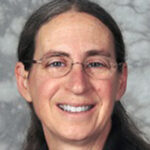
Sandia National Laboratories
Date: October 18th, 2016
Time: 7:00 PM
Location: Duke Energy Hall, Hunt Library
Talk Title: The Power Behind The Throne: Information Integration in the Age of Data-Driven Discovery
Abstract
Integrating data has always been a challenge. The information management community has made great progress in tackling this challenge, both on the theory and the practice. But in the last ten years, the world has changed dramatically. New platforms, devices and applications have made huge volumes of heterogeneous data available at speeds never contemplated before, while the quality of the available data has if anything degraded.
Dr. Jeff Leek

Date: November 2nd, 2016
Time: 7:00 PM
Location: Mountains Ballroom, Talley Student Union
Talk Title: Is Most Published Research Really False?
Abstract
The accuracy of published research is critical for scientists, physicians and patients who rely on these results. But the fundamental belief in the scientific literature was called into serious question by a paper suggesting most published medical research is false. This claim has launched an entire discipline focused on the crisis of reproducibility and replicability of science. In this talk I will discuss two major open problems inspired by this scientific crisis: how do we know when a study replicates and what is the rate of false discoveries in the scientific literature? In answering these questions I will argue that much of the crisis in science can be attributed to misunderstanding statistics.
Dr. Deen Freelon
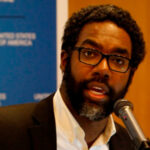
Date: March 15th, 2016
Time: 5:30 PM
Location: Mountains Ballroom, Talley Student Union
Talk Title: Toward a Framework for Inferring Individual-Level Characteristics from Digital Trace Data
Abstract
Digital traces—records of online activity automatically recorded by the servers that undergird all online activity—allow us to explore age-old communication research questions in unprecedented ways. But one of the greatest challenges in doing so is managing the gap between the research’s conceptual focus and the set of readily available traces. Not every type of trace will be equally valuable from a particular research standpoint, and not every interesting concept will be measurable using the traces to which researchers have access.